UWS - NURS09179: A Case Study on the Loss of a Spouse & Support
VerifiedAdded on 2023/04/19
|12
|3278
|500
Case Study
AI Summary
This assignment provides a detailed case study analysis of the loss of a spouse, exploring the profound grief, emotional and physical pain, and loneliness associated with spousal bereavement. It delves into the physiological health outcomes and the impact on the surviving spouse's social standing. The study also identifies key professionals, including psychologists, nursing professionals, and grief support groups, who can provide crucial support through cognitive behavioral therapy, comprehensive care, and community-based services. The role of nurses in managing grief-related stress, sleep disturbances, and nutritional needs is highlighted, along with the importance of therapeutic relationships. The assignment emphasizes the significance of community support in helping individuals navigate their grief and return to normal lives. Desklib offers students access to this assignment and many other solved papers.
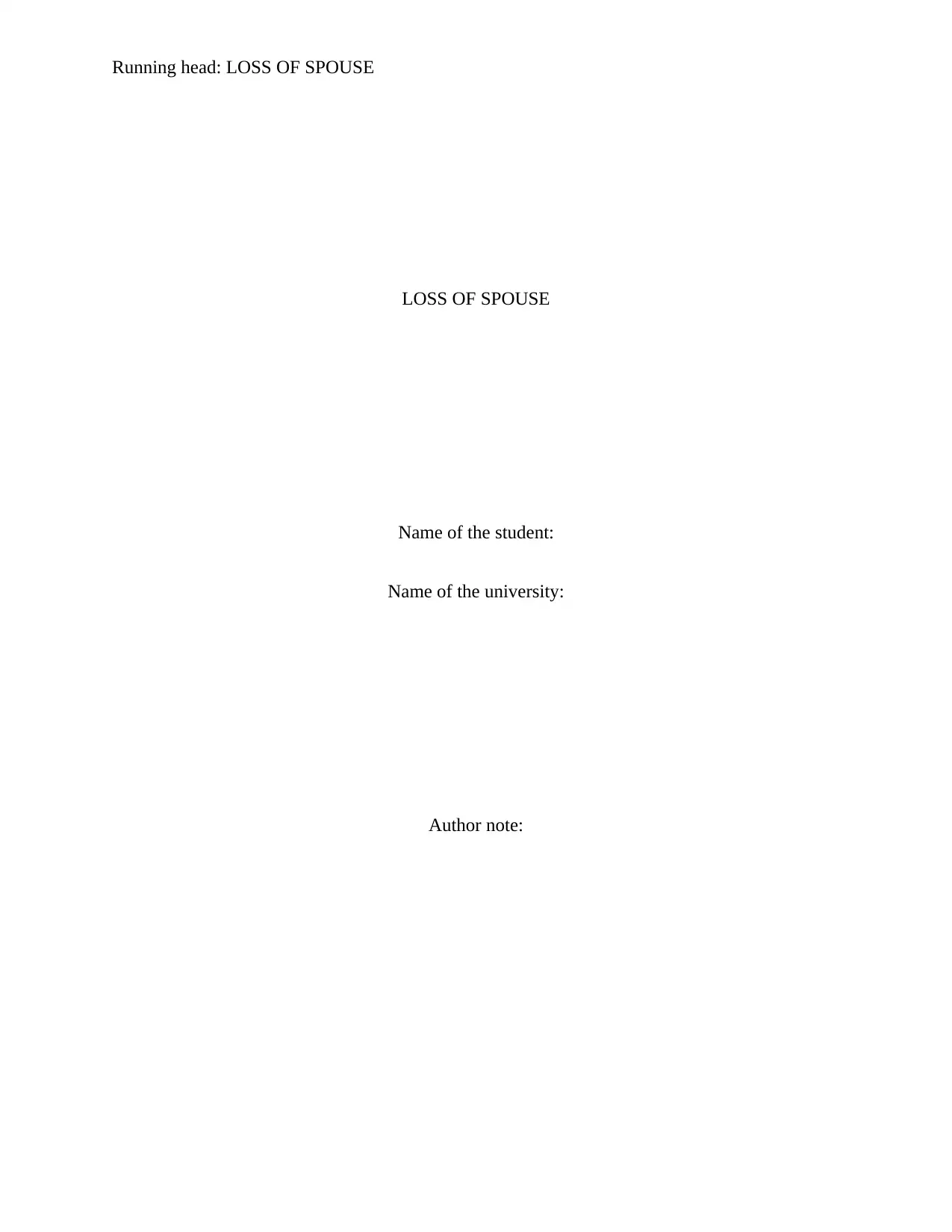
Running head: LOSS OF SPOUSE
LOSS OF SPOUSE
Name of the student:
Name of the university:
Author note:
LOSS OF SPOUSE
Name of the student:
Name of the university:
Author note:
Paraphrase This Document
Need a fresh take? Get an instant paraphrase of this document with our AI Paraphraser
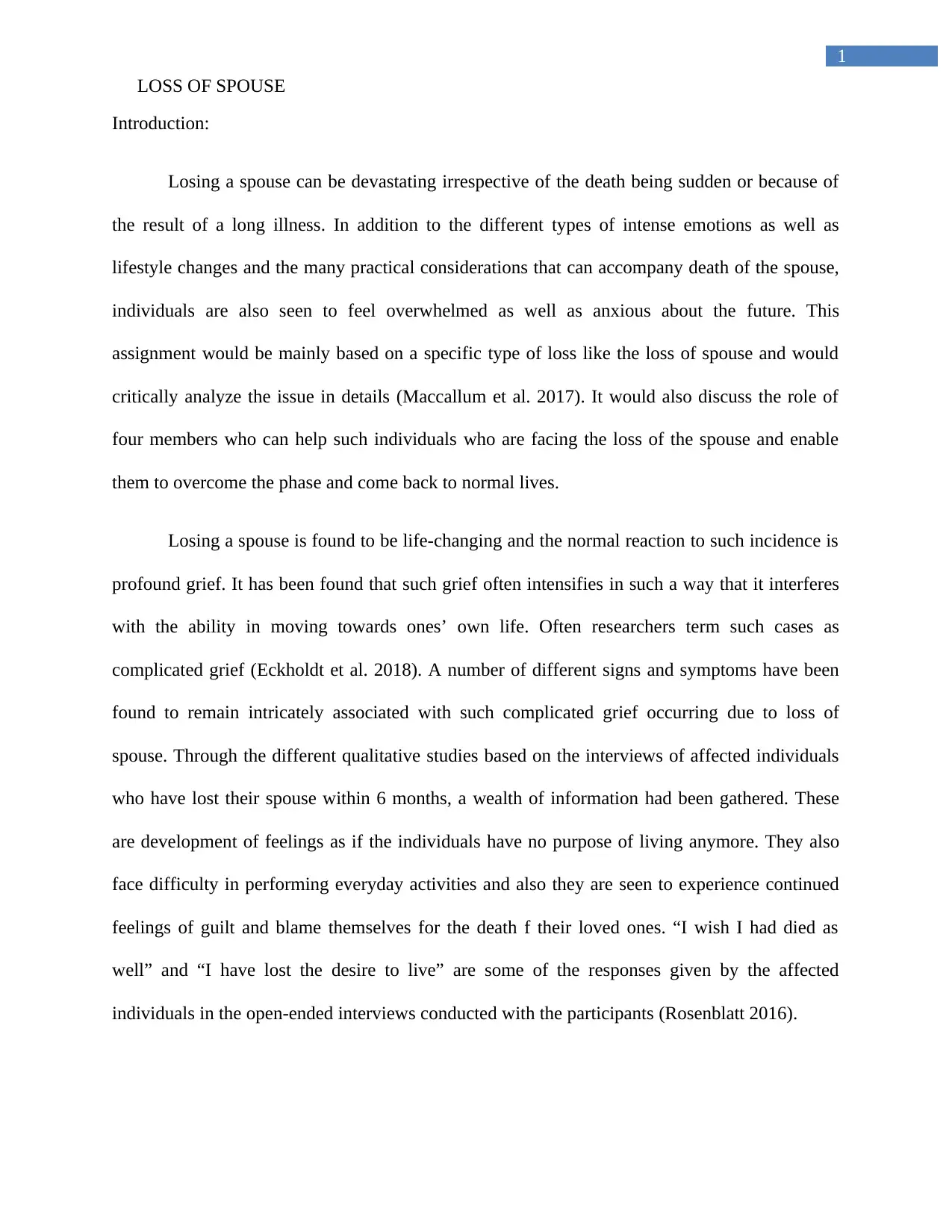
1
LOSS OF SPOUSE
Introduction:
Losing a spouse can be devastating irrespective of the death being sudden or because of
the result of a long illness. In addition to the different types of intense emotions as well as
lifestyle changes and the many practical considerations that can accompany death of the spouse,
individuals are also seen to feel overwhelmed as well as anxious about the future. This
assignment would be mainly based on a specific type of loss like the loss of spouse and would
critically analyze the issue in details (Maccallum et al. 2017). It would also discuss the role of
four members who can help such individuals who are facing the loss of the spouse and enable
them to overcome the phase and come back to normal lives.
Losing a spouse is found to be life-changing and the normal reaction to such incidence is
profound grief. It has been found that such grief often intensifies in such a way that it interferes
with the ability in moving towards ones’ own life. Often researchers term such cases as
complicated grief (Eckholdt et al. 2018). A number of different signs and symptoms have been
found to remain intricately associated with such complicated grief occurring due to loss of
spouse. Through the different qualitative studies based on the interviews of affected individuals
who have lost their spouse within 6 months, a wealth of information had been gathered. These
are development of feelings as if the individuals have no purpose of living anymore. They also
face difficulty in performing everyday activities and also they are seen to experience continued
feelings of guilt and blame themselves for the death f their loved ones. “I wish I had died as
well” and “I have lost the desire to live” are some of the responses given by the affected
individuals in the open-ended interviews conducted with the participants (Rosenblatt 2016).
LOSS OF SPOUSE
Introduction:
Losing a spouse can be devastating irrespective of the death being sudden or because of
the result of a long illness. In addition to the different types of intense emotions as well as
lifestyle changes and the many practical considerations that can accompany death of the spouse,
individuals are also seen to feel overwhelmed as well as anxious about the future. This
assignment would be mainly based on a specific type of loss like the loss of spouse and would
critically analyze the issue in details (Maccallum et al. 2017). It would also discuss the role of
four members who can help such individuals who are facing the loss of the spouse and enable
them to overcome the phase and come back to normal lives.
Losing a spouse is found to be life-changing and the normal reaction to such incidence is
profound grief. It has been found that such grief often intensifies in such a way that it interferes
with the ability in moving towards ones’ own life. Often researchers term such cases as
complicated grief (Eckholdt et al. 2018). A number of different signs and symptoms have been
found to remain intricately associated with such complicated grief occurring due to loss of
spouse. Through the different qualitative studies based on the interviews of affected individuals
who have lost their spouse within 6 months, a wealth of information had been gathered. These
are development of feelings as if the individuals have no purpose of living anymore. They also
face difficulty in performing everyday activities and also they are seen to experience continued
feelings of guilt and blame themselves for the death f their loved ones. “I wish I had died as
well” and “I have lost the desire to live” are some of the responses given by the affected
individuals in the open-ended interviews conducted with the participants (Rosenblatt 2016).
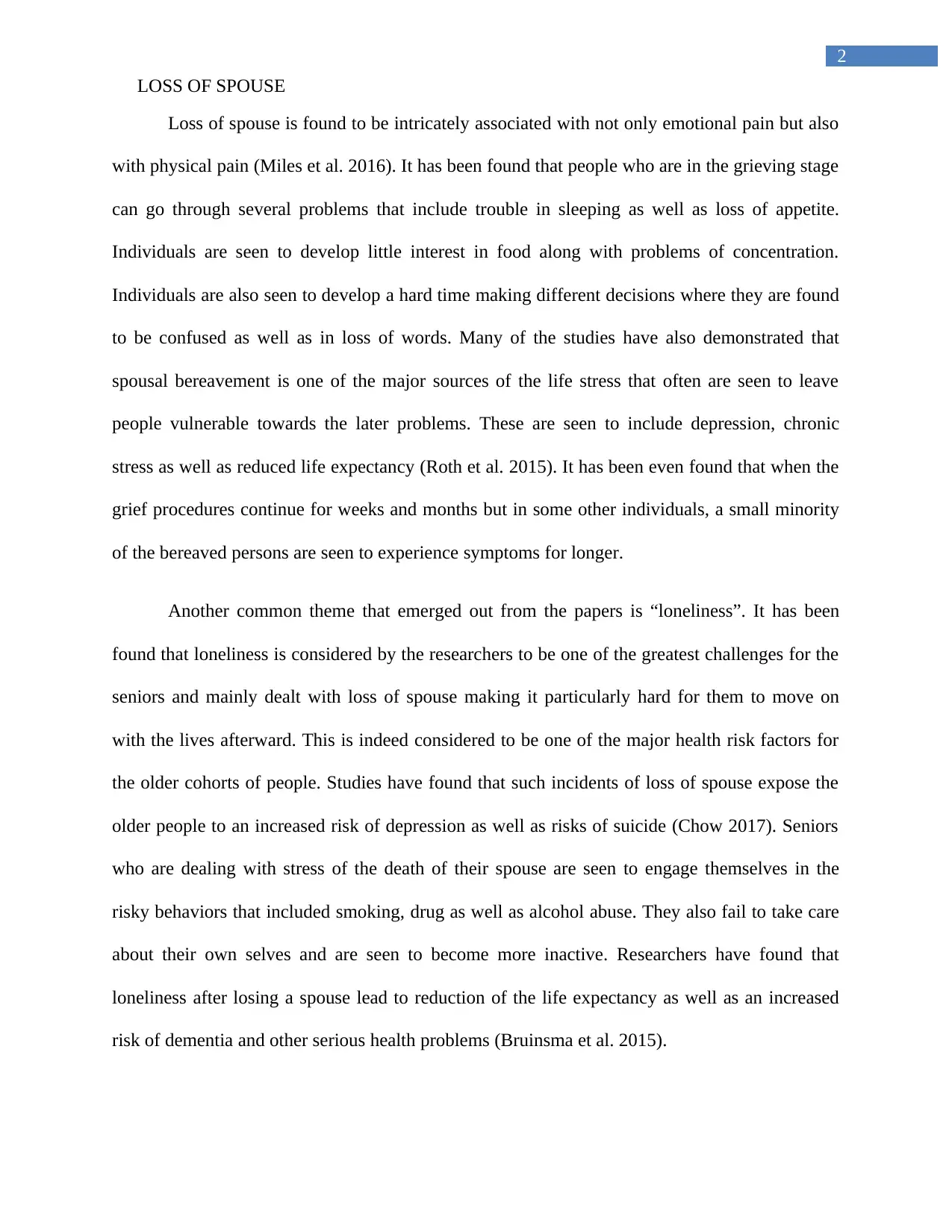
2
LOSS OF SPOUSE
Loss of spouse is found to be intricately associated with not only emotional pain but also
with physical pain (Miles et al. 2016). It has been found that people who are in the grieving stage
can go through several problems that include trouble in sleeping as well as loss of appetite.
Individuals are seen to develop little interest in food along with problems of concentration.
Individuals are also seen to develop a hard time making different decisions where they are found
to be confused as well as in loss of words. Many of the studies have also demonstrated that
spousal bereavement is one of the major sources of the life stress that often are seen to leave
people vulnerable towards the later problems. These are seen to include depression, chronic
stress as well as reduced life expectancy (Roth et al. 2015). It has been even found that when the
grief procedures continue for weeks and months but in some other individuals, a small minority
of the bereaved persons are seen to experience symptoms for longer.
Another common theme that emerged out from the papers is “loneliness”. It has been
found that loneliness is considered by the researchers to be one of the greatest challenges for the
seniors and mainly dealt with loss of spouse making it particularly hard for them to move on
with the lives afterward. This is indeed considered to be one of the major health risk factors for
the older cohorts of people. Studies have found that such incidents of loss of spouse expose the
older people to an increased risk of depression as well as risks of suicide (Chow 2017). Seniors
who are dealing with stress of the death of their spouse are seen to engage themselves in the
risky behaviors that included smoking, drug as well as alcohol abuse. They also fail to take care
about their own selves and are seen to become more inactive. Researchers have found that
loneliness after losing a spouse lead to reduction of the life expectancy as well as an increased
risk of dementia and other serious health problems (Bruinsma et al. 2015).
LOSS OF SPOUSE
Loss of spouse is found to be intricately associated with not only emotional pain but also
with physical pain (Miles et al. 2016). It has been found that people who are in the grieving stage
can go through several problems that include trouble in sleeping as well as loss of appetite.
Individuals are seen to develop little interest in food along with problems of concentration.
Individuals are also seen to develop a hard time making different decisions where they are found
to be confused as well as in loss of words. Many of the studies have also demonstrated that
spousal bereavement is one of the major sources of the life stress that often are seen to leave
people vulnerable towards the later problems. These are seen to include depression, chronic
stress as well as reduced life expectancy (Roth et al. 2015). It has been even found that when the
grief procedures continue for weeks and months but in some other individuals, a small minority
of the bereaved persons are seen to experience symptoms for longer.
Another common theme that emerged out from the papers is “loneliness”. It has been
found that loneliness is considered by the researchers to be one of the greatest challenges for the
seniors and mainly dealt with loss of spouse making it particularly hard for them to move on
with the lives afterward. This is indeed considered to be one of the major health risk factors for
the older cohorts of people. Studies have found that such incidents of loss of spouse expose the
older people to an increased risk of depression as well as risks of suicide (Chow 2017). Seniors
who are dealing with stress of the death of their spouse are seen to engage themselves in the
risky behaviors that included smoking, drug as well as alcohol abuse. They also fail to take care
about their own selves and are seen to become more inactive. Researchers have found that
loneliness after losing a spouse lead to reduction of the life expectancy as well as an increased
risk of dementia and other serious health problems (Bruinsma et al. 2015).
⊘ This is a preview!⊘
Do you want full access?
Subscribe today to unlock all pages.

Trusted by 1+ million students worldwide
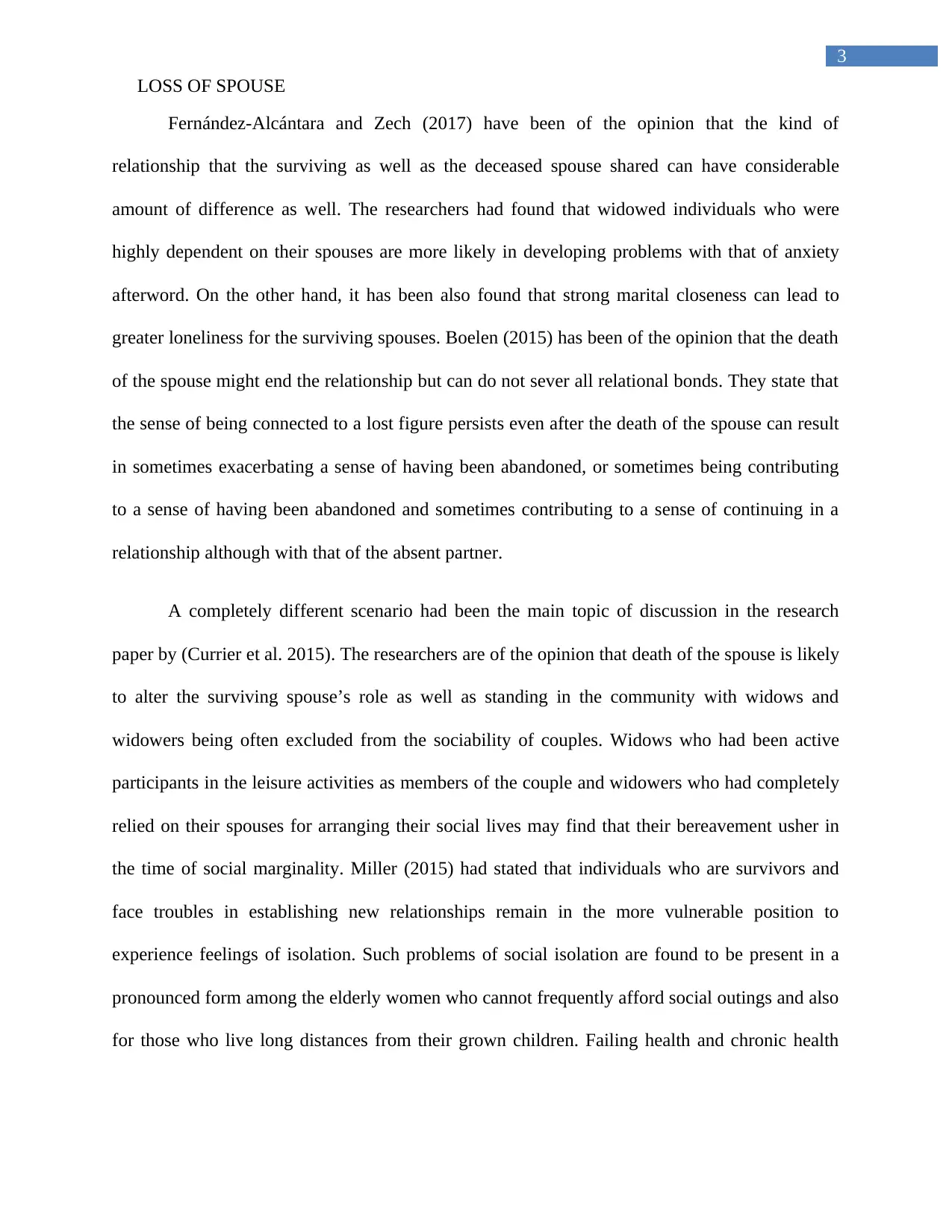
3
LOSS OF SPOUSE
Fernández-Alcántara and Zech (2017) have been of the opinion that the kind of
relationship that the surviving as well as the deceased spouse shared can have considerable
amount of difference as well. The researchers had found that widowed individuals who were
highly dependent on their spouses are more likely in developing problems with that of anxiety
afterword. On the other hand, it has been also found that strong marital closeness can lead to
greater loneliness for the surviving spouses. Boelen (2015) has been of the opinion that the death
of the spouse might end the relationship but can do not sever all relational bonds. They state that
the sense of being connected to a lost figure persists even after the death of the spouse can result
in sometimes exacerbating a sense of having been abandoned, or sometimes being contributing
to a sense of having been abandoned and sometimes contributing to a sense of continuing in a
relationship although with that of the absent partner.
A completely different scenario had been the main topic of discussion in the research
paper by (Currier et al. 2015). The researchers are of the opinion that death of the spouse is likely
to alter the surviving spouse’s role as well as standing in the community with widows and
widowers being often excluded from the sociability of couples. Widows who had been active
participants in the leisure activities as members of the couple and widowers who had completely
relied on their spouses for arranging their social lives may find that their bereavement usher in
the time of social marginality. Miller (2015) had stated that individuals who are survivors and
face troubles in establishing new relationships remain in the more vulnerable position to
experience feelings of isolation. Such problems of social isolation are found to be present in a
pronounced form among the elderly women who cannot frequently afford social outings and also
for those who live long distances from their grown children. Failing health and chronic health
LOSS OF SPOUSE
Fernández-Alcántara and Zech (2017) have been of the opinion that the kind of
relationship that the surviving as well as the deceased spouse shared can have considerable
amount of difference as well. The researchers had found that widowed individuals who were
highly dependent on their spouses are more likely in developing problems with that of anxiety
afterword. On the other hand, it has been also found that strong marital closeness can lead to
greater loneliness for the surviving spouses. Boelen (2015) has been of the opinion that the death
of the spouse might end the relationship but can do not sever all relational bonds. They state that
the sense of being connected to a lost figure persists even after the death of the spouse can result
in sometimes exacerbating a sense of having been abandoned, or sometimes being contributing
to a sense of having been abandoned and sometimes contributing to a sense of continuing in a
relationship although with that of the absent partner.
A completely different scenario had been the main topic of discussion in the research
paper by (Currier et al. 2015). The researchers are of the opinion that death of the spouse is likely
to alter the surviving spouse’s role as well as standing in the community with widows and
widowers being often excluded from the sociability of couples. Widows who had been active
participants in the leisure activities as members of the couple and widowers who had completely
relied on their spouses for arranging their social lives may find that their bereavement usher in
the time of social marginality. Miller (2015) had stated that individuals who are survivors and
face troubles in establishing new relationships remain in the more vulnerable position to
experience feelings of isolation. Such problems of social isolation are found to be present in a
pronounced form among the elderly women who cannot frequently afford social outings and also
for those who live long distances from their grown children. Failing health and chronic health
Paraphrase This Document
Need a fresh take? Get an instant paraphrase of this document with our AI Paraphraser
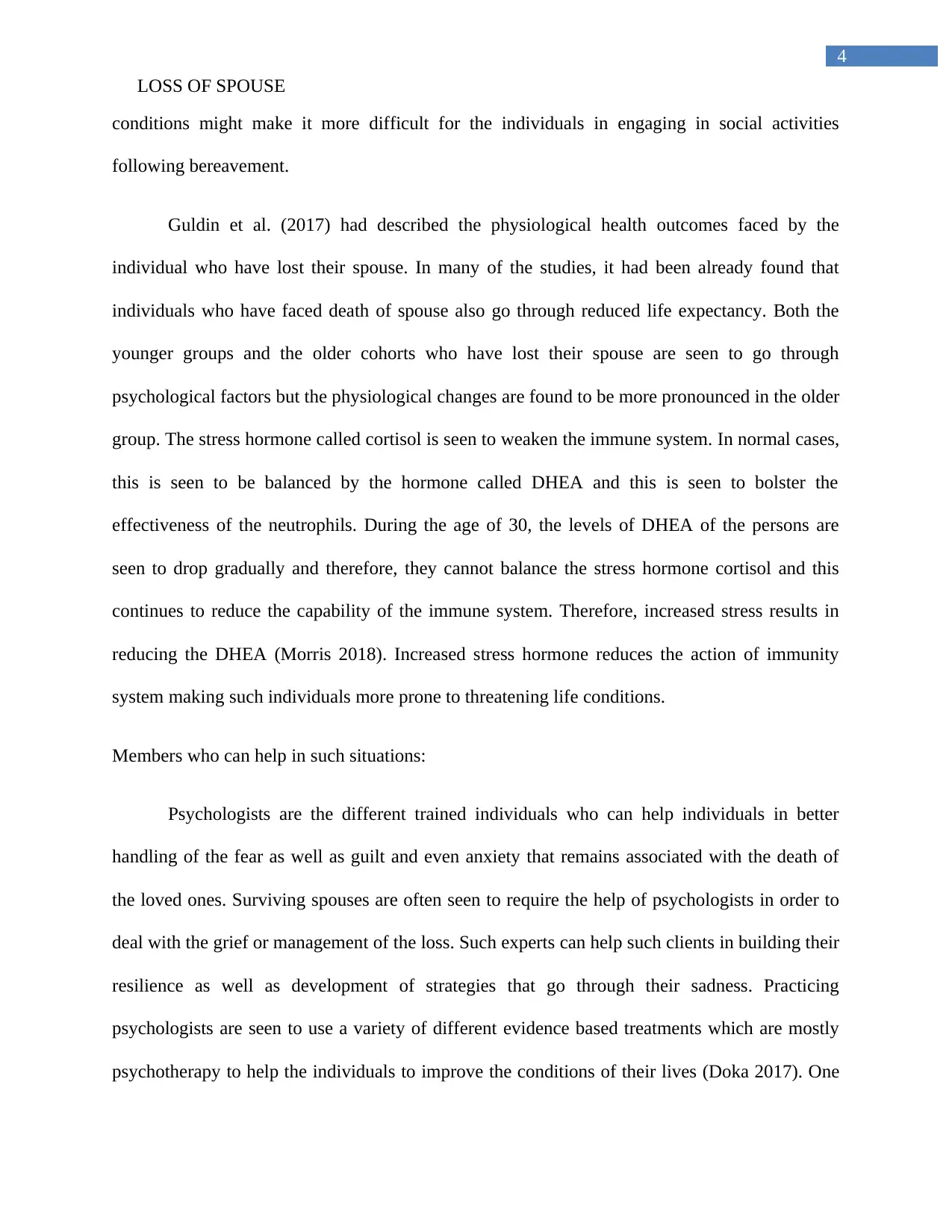
4
LOSS OF SPOUSE
conditions might make it more difficult for the individuals in engaging in social activities
following bereavement.
Guldin et al. (2017) had described the physiological health outcomes faced by the
individual who have lost their spouse. In many of the studies, it had been already found that
individuals who have faced death of spouse also go through reduced life expectancy. Both the
younger groups and the older cohorts who have lost their spouse are seen to go through
psychological factors but the physiological changes are found to be more pronounced in the older
group. The stress hormone called cortisol is seen to weaken the immune system. In normal cases,
this is seen to be balanced by the hormone called DHEA and this is seen to bolster the
effectiveness of the neutrophils. During the age of 30, the levels of DHEA of the persons are
seen to drop gradually and therefore, they cannot balance the stress hormone cortisol and this
continues to reduce the capability of the immune system. Therefore, increased stress results in
reducing the DHEA (Morris 2018). Increased stress hormone reduces the action of immunity
system making such individuals more prone to threatening life conditions.
Members who can help in such situations:
Psychologists are the different trained individuals who can help individuals in better
handling of the fear as well as guilt and even anxiety that remains associated with the death of
the loved ones. Surviving spouses are often seen to require the help of psychologists in order to
deal with the grief or management of the loss. Such experts can help such clients in building their
resilience as well as development of strategies that go through their sadness. Practicing
psychologists are seen to use a variety of different evidence based treatments which are mostly
psychotherapy to help the individuals to improve the conditions of their lives (Doka 2017). One
LOSS OF SPOUSE
conditions might make it more difficult for the individuals in engaging in social activities
following bereavement.
Guldin et al. (2017) had described the physiological health outcomes faced by the
individual who have lost their spouse. In many of the studies, it had been already found that
individuals who have faced death of spouse also go through reduced life expectancy. Both the
younger groups and the older cohorts who have lost their spouse are seen to go through
psychological factors but the physiological changes are found to be more pronounced in the older
group. The stress hormone called cortisol is seen to weaken the immune system. In normal cases,
this is seen to be balanced by the hormone called DHEA and this is seen to bolster the
effectiveness of the neutrophils. During the age of 30, the levels of DHEA of the persons are
seen to drop gradually and therefore, they cannot balance the stress hormone cortisol and this
continues to reduce the capability of the immune system. Therefore, increased stress results in
reducing the DHEA (Morris 2018). Increased stress hormone reduces the action of immunity
system making such individuals more prone to threatening life conditions.
Members who can help in such situations:
Psychologists are the different trained individuals who can help individuals in better
handling of the fear as well as guilt and even anxiety that remains associated with the death of
the loved ones. Surviving spouses are often seen to require the help of psychologists in order to
deal with the grief or management of the loss. Such experts can help such clients in building their
resilience as well as development of strategies that go through their sadness. Practicing
psychologists are seen to use a variety of different evidence based treatments which are mostly
psychotherapy to help the individuals to improve the conditions of their lives (Doka 2017). One
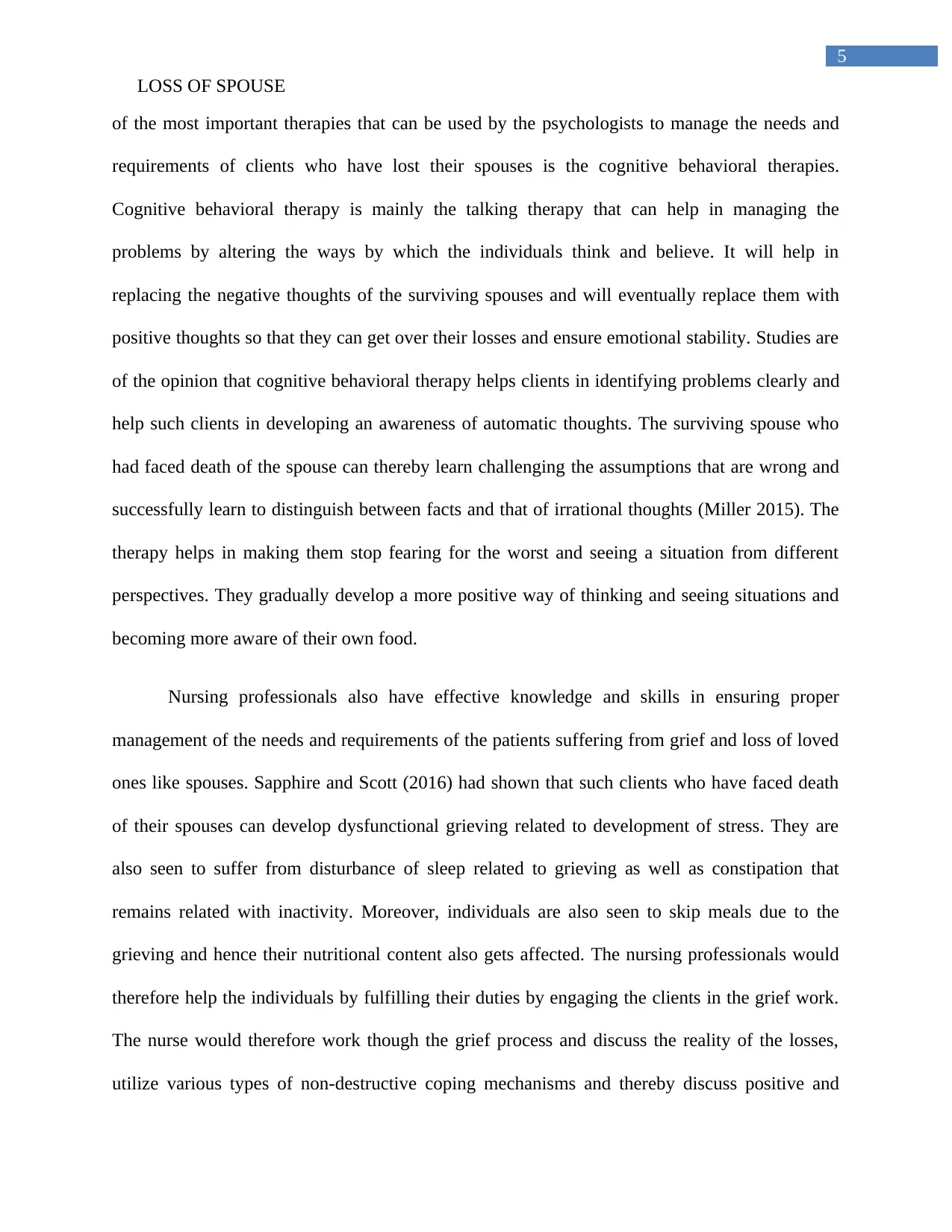
5
LOSS OF SPOUSE
of the most important therapies that can be used by the psychologists to manage the needs and
requirements of clients who have lost their spouses is the cognitive behavioral therapies.
Cognitive behavioral therapy is mainly the talking therapy that can help in managing the
problems by altering the ways by which the individuals think and believe. It will help in
replacing the negative thoughts of the surviving spouses and will eventually replace them with
positive thoughts so that they can get over their losses and ensure emotional stability. Studies are
of the opinion that cognitive behavioral therapy helps clients in identifying problems clearly and
help such clients in developing an awareness of automatic thoughts. The surviving spouse who
had faced death of the spouse can thereby learn challenging the assumptions that are wrong and
successfully learn to distinguish between facts and that of irrational thoughts (Miller 2015). The
therapy helps in making them stop fearing for the worst and seeing a situation from different
perspectives. They gradually develop a more positive way of thinking and seeing situations and
becoming more aware of their own food.
Nursing professionals also have effective knowledge and skills in ensuring proper
management of the needs and requirements of the patients suffering from grief and loss of loved
ones like spouses. Sapphire and Scott (2016) had shown that such clients who have faced death
of their spouses can develop dysfunctional grieving related to development of stress. They are
also seen to suffer from disturbance of sleep related to grieving as well as constipation that
remains related with inactivity. Moreover, individuals are also seen to skip meals due to the
grieving and hence their nutritional content also gets affected. The nursing professionals would
therefore help the individuals by fulfilling their duties by engaging the clients in the grief work.
The nurse would therefore work though the grief process and discuss the reality of the losses,
utilize various types of non-destructive coping mechanisms and thereby discuss positive and
LOSS OF SPOUSE
of the most important therapies that can be used by the psychologists to manage the needs and
requirements of clients who have lost their spouses is the cognitive behavioral therapies.
Cognitive behavioral therapy is mainly the talking therapy that can help in managing the
problems by altering the ways by which the individuals think and believe. It will help in
replacing the negative thoughts of the surviving spouses and will eventually replace them with
positive thoughts so that they can get over their losses and ensure emotional stability. Studies are
of the opinion that cognitive behavioral therapy helps clients in identifying problems clearly and
help such clients in developing an awareness of automatic thoughts. The surviving spouse who
had faced death of the spouse can thereby learn challenging the assumptions that are wrong and
successfully learn to distinguish between facts and that of irrational thoughts (Miller 2015). The
therapy helps in making them stop fearing for the worst and seeing a situation from different
perspectives. They gradually develop a more positive way of thinking and seeing situations and
becoming more aware of their own food.
Nursing professionals also have effective knowledge and skills in ensuring proper
management of the needs and requirements of the patients suffering from grief and loss of loved
ones like spouses. Sapphire and Scott (2016) had shown that such clients who have faced death
of their spouses can develop dysfunctional grieving related to development of stress. They are
also seen to suffer from disturbance of sleep related to grieving as well as constipation that
remains related with inactivity. Moreover, individuals are also seen to skip meals due to the
grieving and hence their nutritional content also gets affected. The nursing professionals would
therefore help the individuals by fulfilling their duties by engaging the clients in the grief work.
The nurse would therefore work though the grief process and discuss the reality of the losses,
utilize various types of non-destructive coping mechanisms and thereby discuss positive and
⊘ This is a preview!⊘
Do you want full access?
Subscribe today to unlock all pages.

Trusted by 1+ million students worldwide
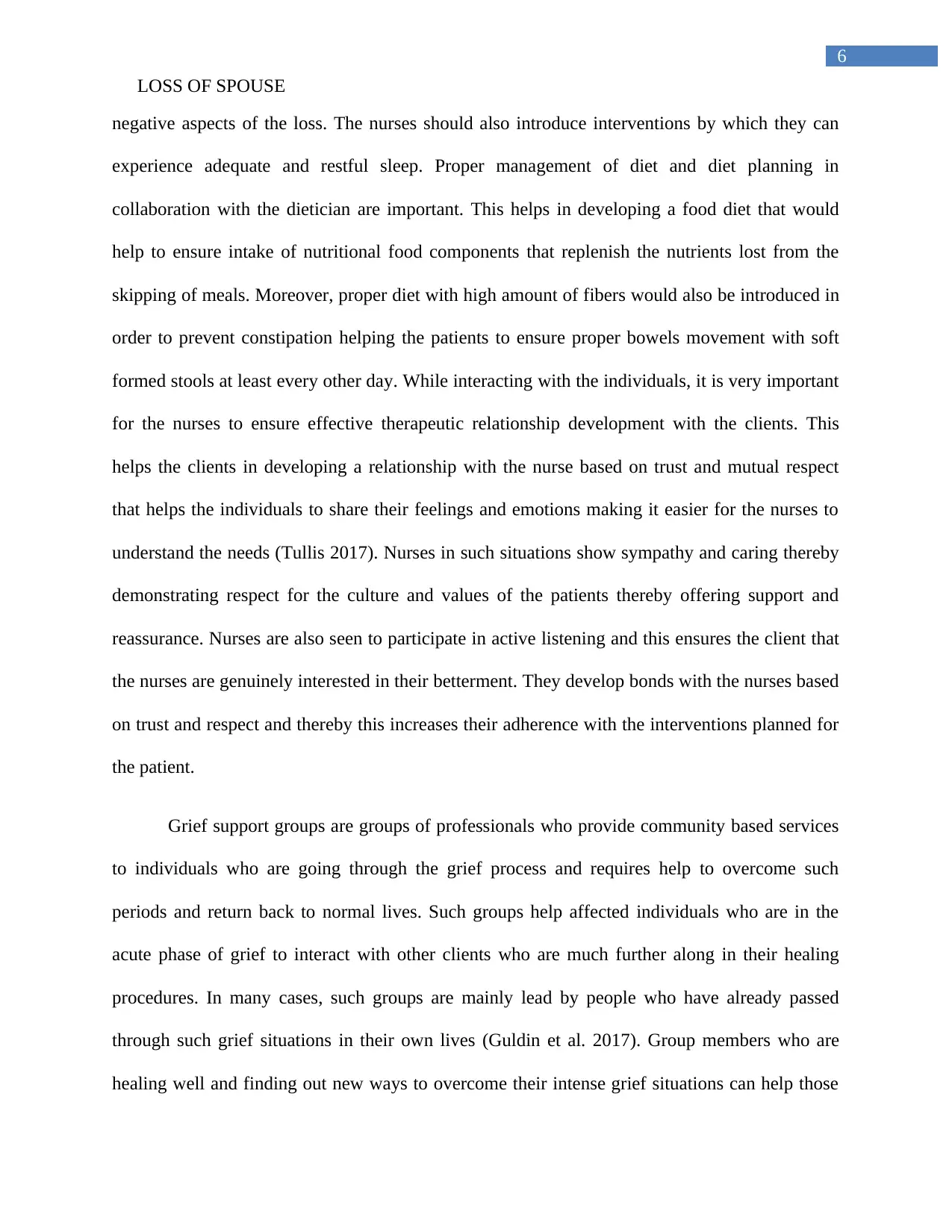
6
LOSS OF SPOUSE
negative aspects of the loss. The nurses should also introduce interventions by which they can
experience adequate and restful sleep. Proper management of diet and diet planning in
collaboration with the dietician are important. This helps in developing a food diet that would
help to ensure intake of nutritional food components that replenish the nutrients lost from the
skipping of meals. Moreover, proper diet with high amount of fibers would also be introduced in
order to prevent constipation helping the patients to ensure proper bowels movement with soft
formed stools at least every other day. While interacting with the individuals, it is very important
for the nurses to ensure effective therapeutic relationship development with the clients. This
helps the clients in developing a relationship with the nurse based on trust and mutual respect
that helps the individuals to share their feelings and emotions making it easier for the nurses to
understand the needs (Tullis 2017). Nurses in such situations show sympathy and caring thereby
demonstrating respect for the culture and values of the patients thereby offering support and
reassurance. Nurses are also seen to participate in active listening and this ensures the client that
the nurses are genuinely interested in their betterment. They develop bonds with the nurses based
on trust and respect and thereby this increases their adherence with the interventions planned for
the patient.
Grief support groups are groups of professionals who provide community based services
to individuals who are going through the grief process and requires help to overcome such
periods and return back to normal lives. Such groups help affected individuals who are in the
acute phase of grief to interact with other clients who are much further along in their healing
procedures. In many cases, such groups are mainly lead by people who have already passed
through such grief situations in their own lives (Guldin et al. 2017). Group members who are
healing well and finding out new ways to overcome their intense grief situations can help those
LOSS OF SPOUSE
negative aspects of the loss. The nurses should also introduce interventions by which they can
experience adequate and restful sleep. Proper management of diet and diet planning in
collaboration with the dietician are important. This helps in developing a food diet that would
help to ensure intake of nutritional food components that replenish the nutrients lost from the
skipping of meals. Moreover, proper diet with high amount of fibers would also be introduced in
order to prevent constipation helping the patients to ensure proper bowels movement with soft
formed stools at least every other day. While interacting with the individuals, it is very important
for the nurses to ensure effective therapeutic relationship development with the clients. This
helps the clients in developing a relationship with the nurse based on trust and mutual respect
that helps the individuals to share their feelings and emotions making it easier for the nurses to
understand the needs (Tullis 2017). Nurses in such situations show sympathy and caring thereby
demonstrating respect for the culture and values of the patients thereby offering support and
reassurance. Nurses are also seen to participate in active listening and this ensures the client that
the nurses are genuinely interested in their betterment. They develop bonds with the nurses based
on trust and respect and thereby this increases their adherence with the interventions planned for
the patient.
Grief support groups are groups of professionals who provide community based services
to individuals who are going through the grief process and requires help to overcome such
periods and return back to normal lives. Such groups help affected individuals who are in the
acute phase of grief to interact with other clients who are much further along in their healing
procedures. In many cases, such groups are mainly lead by people who have already passed
through such grief situations in their own lives (Guldin et al. 2017). Group members who are
healing well and finding out new ways to overcome their intense grief situations can help those
Paraphrase This Document
Need a fresh take? Get an instant paraphrase of this document with our AI Paraphraser
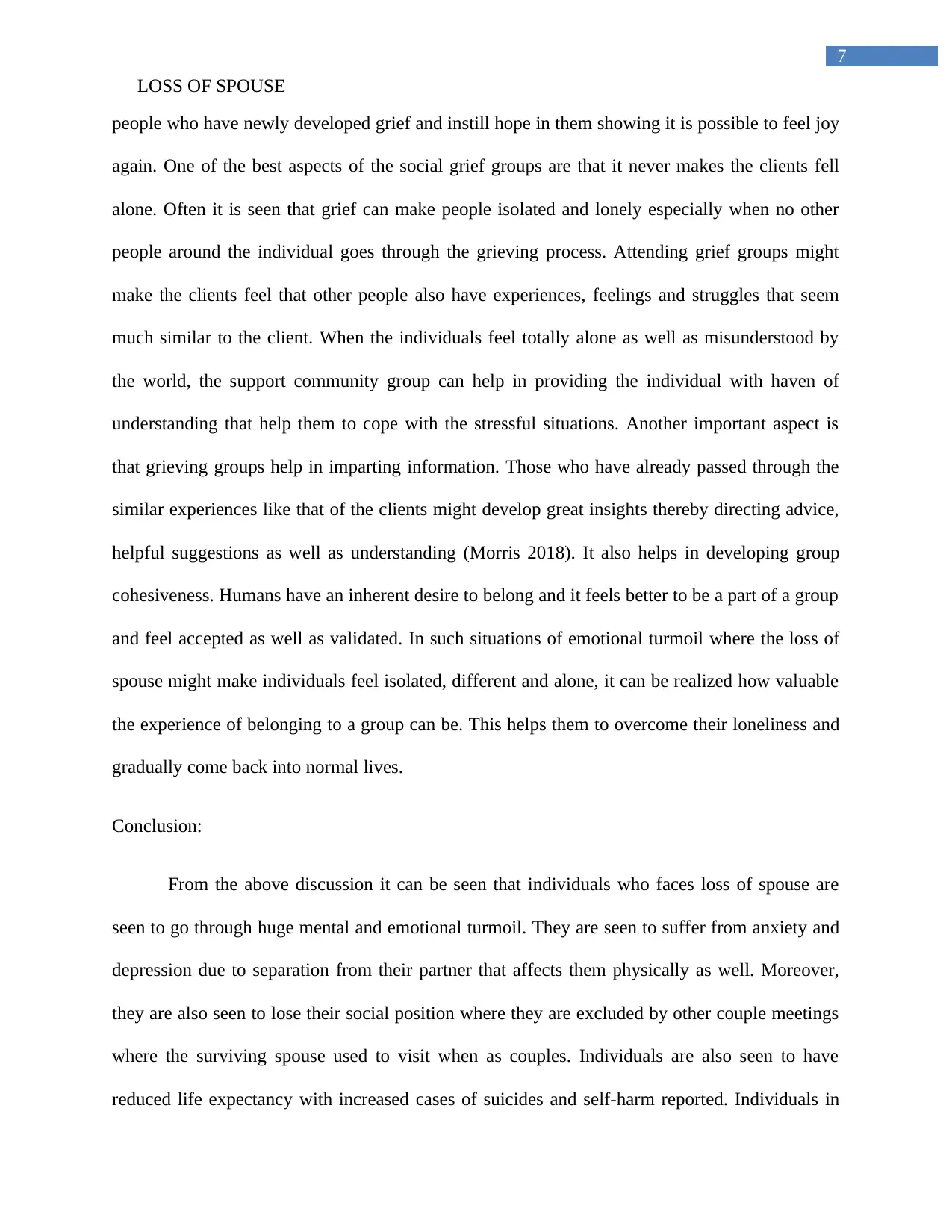
7
LOSS OF SPOUSE
people who have newly developed grief and instill hope in them showing it is possible to feel joy
again. One of the best aspects of the social grief groups are that it never makes the clients fell
alone. Often it is seen that grief can make people isolated and lonely especially when no other
people around the individual goes through the grieving process. Attending grief groups might
make the clients feel that other people also have experiences, feelings and struggles that seem
much similar to the client. When the individuals feel totally alone as well as misunderstood by
the world, the support community group can help in providing the individual with haven of
understanding that help them to cope with the stressful situations. Another important aspect is
that grieving groups help in imparting information. Those who have already passed through the
similar experiences like that of the clients might develop great insights thereby directing advice,
helpful suggestions as well as understanding (Morris 2018). It also helps in developing group
cohesiveness. Humans have an inherent desire to belong and it feels better to be a part of a group
and feel accepted as well as validated. In such situations of emotional turmoil where the loss of
spouse might make individuals feel isolated, different and alone, it can be realized how valuable
the experience of belonging to a group can be. This helps them to overcome their loneliness and
gradually come back into normal lives.
Conclusion:
From the above discussion it can be seen that individuals who faces loss of spouse are
seen to go through huge mental and emotional turmoil. They are seen to suffer from anxiety and
depression due to separation from their partner that affects them physically as well. Moreover,
they are also seen to lose their social position where they are excluded by other couple meetings
where the surviving spouse used to visit when as couples. Individuals are also seen to have
reduced life expectancy with increased cases of suicides and self-harm reported. Individuals in
LOSS OF SPOUSE
people who have newly developed grief and instill hope in them showing it is possible to feel joy
again. One of the best aspects of the social grief groups are that it never makes the clients fell
alone. Often it is seen that grief can make people isolated and lonely especially when no other
people around the individual goes through the grieving process. Attending grief groups might
make the clients feel that other people also have experiences, feelings and struggles that seem
much similar to the client. When the individuals feel totally alone as well as misunderstood by
the world, the support community group can help in providing the individual with haven of
understanding that help them to cope with the stressful situations. Another important aspect is
that grieving groups help in imparting information. Those who have already passed through the
similar experiences like that of the clients might develop great insights thereby directing advice,
helpful suggestions as well as understanding (Morris 2018). It also helps in developing group
cohesiveness. Humans have an inherent desire to belong and it feels better to be a part of a group
and feel accepted as well as validated. In such situations of emotional turmoil where the loss of
spouse might make individuals feel isolated, different and alone, it can be realized how valuable
the experience of belonging to a group can be. This helps them to overcome their loneliness and
gradually come back into normal lives.
Conclusion:
From the above discussion it can be seen that individuals who faces loss of spouse are
seen to go through huge mental and emotional turmoil. They are seen to suffer from anxiety and
depression due to separation from their partner that affects them physically as well. Moreover,
they are also seen to lose their social position where they are excluded by other couple meetings
where the surviving spouse used to visit when as couples. Individuals are also seen to have
reduced life expectancy with increased cases of suicides and self-harm reported. Individuals in
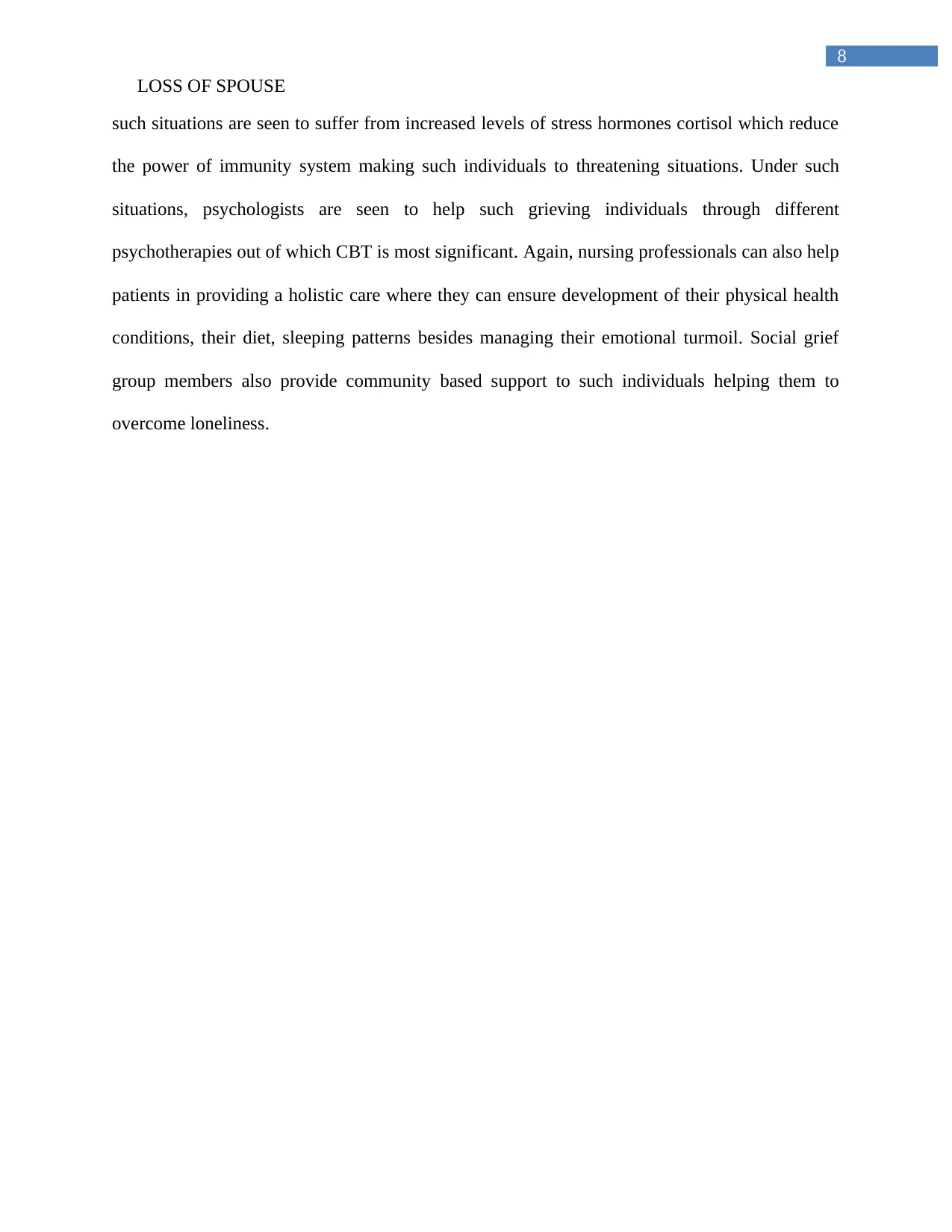
8
LOSS OF SPOUSE
such situations are seen to suffer from increased levels of stress hormones cortisol which reduce
the power of immunity system making such individuals to threatening situations. Under such
situations, psychologists are seen to help such grieving individuals through different
psychotherapies out of which CBT is most significant. Again, nursing professionals can also help
patients in providing a holistic care where they can ensure development of their physical health
conditions, their diet, sleeping patterns besides managing their emotional turmoil. Social grief
group members also provide community based support to such individuals helping them to
overcome loneliness.
LOSS OF SPOUSE
such situations are seen to suffer from increased levels of stress hormones cortisol which reduce
the power of immunity system making such individuals to threatening situations. Under such
situations, psychologists are seen to help such grieving individuals through different
psychotherapies out of which CBT is most significant. Again, nursing professionals can also help
patients in providing a holistic care where they can ensure development of their physical health
conditions, their diet, sleeping patterns besides managing their emotional turmoil. Social grief
group members also provide community based support to such individuals helping them to
overcome loneliness.
⊘ This is a preview!⊘
Do you want full access?
Subscribe today to unlock all pages.

Trusted by 1+ million students worldwide
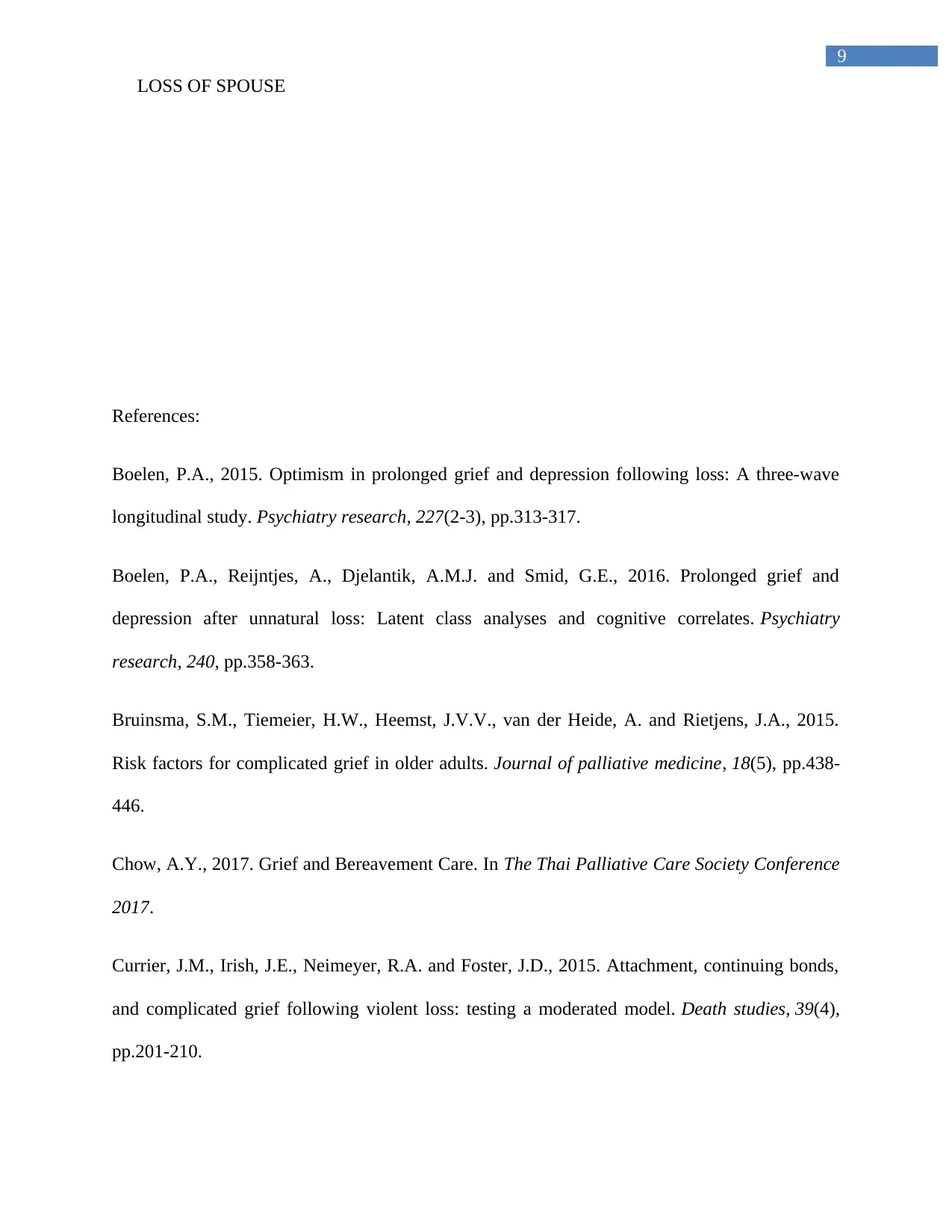
9
LOSS OF SPOUSE
References:
Boelen, P.A., 2015. Optimism in prolonged grief and depression following loss: A three-wave
longitudinal study. Psychiatry research, 227(2-3), pp.313-317.
Boelen, P.A., Reijntjes, A., Djelantik, A.M.J. and Smid, G.E., 2016. Prolonged grief and
depression after unnatural loss: Latent class analyses and cognitive correlates. Psychiatry
research, 240, pp.358-363.
Bruinsma, S.M., Tiemeier, H.W., Heemst, J.V.V., van der Heide, A. and Rietjens, J.A., 2015.
Risk factors for complicated grief in older adults. Journal of palliative medicine, 18(5), pp.438-
446.
Chow, A.Y., 2017. Grief and Bereavement Care. In The Thai Palliative Care Society Conference
2017.
Currier, J.M., Irish, J.E., Neimeyer, R.A. and Foster, J.D., 2015. Attachment, continuing bonds,
and complicated grief following violent loss: testing a moderated model. Death studies, 39(4),
pp.201-210.
LOSS OF SPOUSE
References:
Boelen, P.A., 2015. Optimism in prolonged grief and depression following loss: A three-wave
longitudinal study. Psychiatry research, 227(2-3), pp.313-317.
Boelen, P.A., Reijntjes, A., Djelantik, A.M.J. and Smid, G.E., 2016. Prolonged grief and
depression after unnatural loss: Latent class analyses and cognitive correlates. Psychiatry
research, 240, pp.358-363.
Bruinsma, S.M., Tiemeier, H.W., Heemst, J.V.V., van der Heide, A. and Rietjens, J.A., 2015.
Risk factors for complicated grief in older adults. Journal of palliative medicine, 18(5), pp.438-
446.
Chow, A.Y., 2017. Grief and Bereavement Care. In The Thai Palliative Care Society Conference
2017.
Currier, J.M., Irish, J.E., Neimeyer, R.A. and Foster, J.D., 2015. Attachment, continuing bonds,
and complicated grief following violent loss: testing a moderated model. Death studies, 39(4),
pp.201-210.
Paraphrase This Document
Need a fresh take? Get an instant paraphrase of this document with our AI Paraphraser
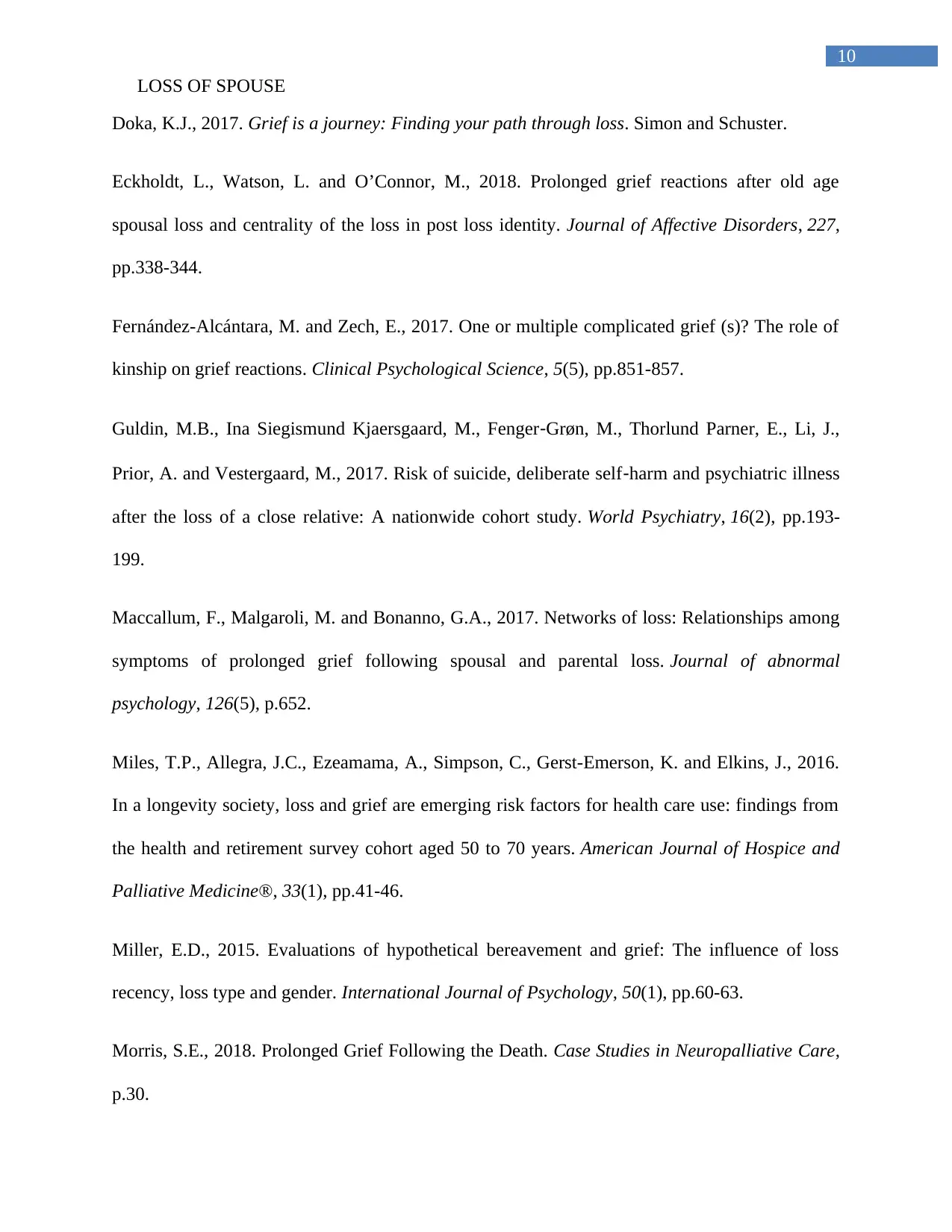
10
LOSS OF SPOUSE
Doka, K.J., 2017. Grief is a journey: Finding your path through loss. Simon and Schuster.
Eckholdt, L., Watson, L. and O’Connor, M., 2018. Prolonged grief reactions after old age
spousal loss and centrality of the loss in post loss identity. Journal of Affective Disorders, 227,
pp.338-344.
Fernández-Alcántara, M. and Zech, E., 2017. One or multiple complicated grief (s)? The role of
kinship on grief reactions. Clinical Psychological Science, 5(5), pp.851-857.
Guldin, M.B., Ina Siegismund Kjaersgaard, M., Fenger‐Grøn, M., Thorlund Parner, E., Li, J.,
Prior, A. and Vestergaard, M., 2017. Risk of suicide, deliberate self‐harm and psychiatric illness
after the loss of a close relative: A nationwide cohort study. World Psychiatry, 16(2), pp.193-
199.
Maccallum, F., Malgaroli, M. and Bonanno, G.A., 2017. Networks of loss: Relationships among
symptoms of prolonged grief following spousal and parental loss. Journal of abnormal
psychology, 126(5), p.652.
Miles, T.P., Allegra, J.C., Ezeamama, A., Simpson, C., Gerst-Emerson, K. and Elkins, J., 2016.
In a longevity society, loss and grief are emerging risk factors for health care use: findings from
the health and retirement survey cohort aged 50 to 70 years. American Journal of Hospice and
Palliative Medicine®, 33(1), pp.41-46.
Miller, E.D., 2015. Evaluations of hypothetical bereavement and grief: The influence of loss
recency, loss type and gender. International Journal of Psychology, 50(1), pp.60-63.
Morris, S.E., 2018. Prolonged Grief Following the Death. Case Studies in Neuropalliative Care,
p.30.
LOSS OF SPOUSE
Doka, K.J., 2017. Grief is a journey: Finding your path through loss. Simon and Schuster.
Eckholdt, L., Watson, L. and O’Connor, M., 2018. Prolonged grief reactions after old age
spousal loss and centrality of the loss in post loss identity. Journal of Affective Disorders, 227,
pp.338-344.
Fernández-Alcántara, M. and Zech, E., 2017. One or multiple complicated grief (s)? The role of
kinship on grief reactions. Clinical Psychological Science, 5(5), pp.851-857.
Guldin, M.B., Ina Siegismund Kjaersgaard, M., Fenger‐Grøn, M., Thorlund Parner, E., Li, J.,
Prior, A. and Vestergaard, M., 2017. Risk of suicide, deliberate self‐harm and psychiatric illness
after the loss of a close relative: A nationwide cohort study. World Psychiatry, 16(2), pp.193-
199.
Maccallum, F., Malgaroli, M. and Bonanno, G.A., 2017. Networks of loss: Relationships among
symptoms of prolonged grief following spousal and parental loss. Journal of abnormal
psychology, 126(5), p.652.
Miles, T.P., Allegra, J.C., Ezeamama, A., Simpson, C., Gerst-Emerson, K. and Elkins, J., 2016.
In a longevity society, loss and grief are emerging risk factors for health care use: findings from
the health and retirement survey cohort aged 50 to 70 years. American Journal of Hospice and
Palliative Medicine®, 33(1), pp.41-46.
Miller, E.D., 2015. Evaluations of hypothetical bereavement and grief: The influence of loss
recency, loss type and gender. International Journal of Psychology, 50(1), pp.60-63.
Morris, S.E., 2018. Prolonged Grief Following the Death. Case Studies in Neuropalliative Care,
p.30.
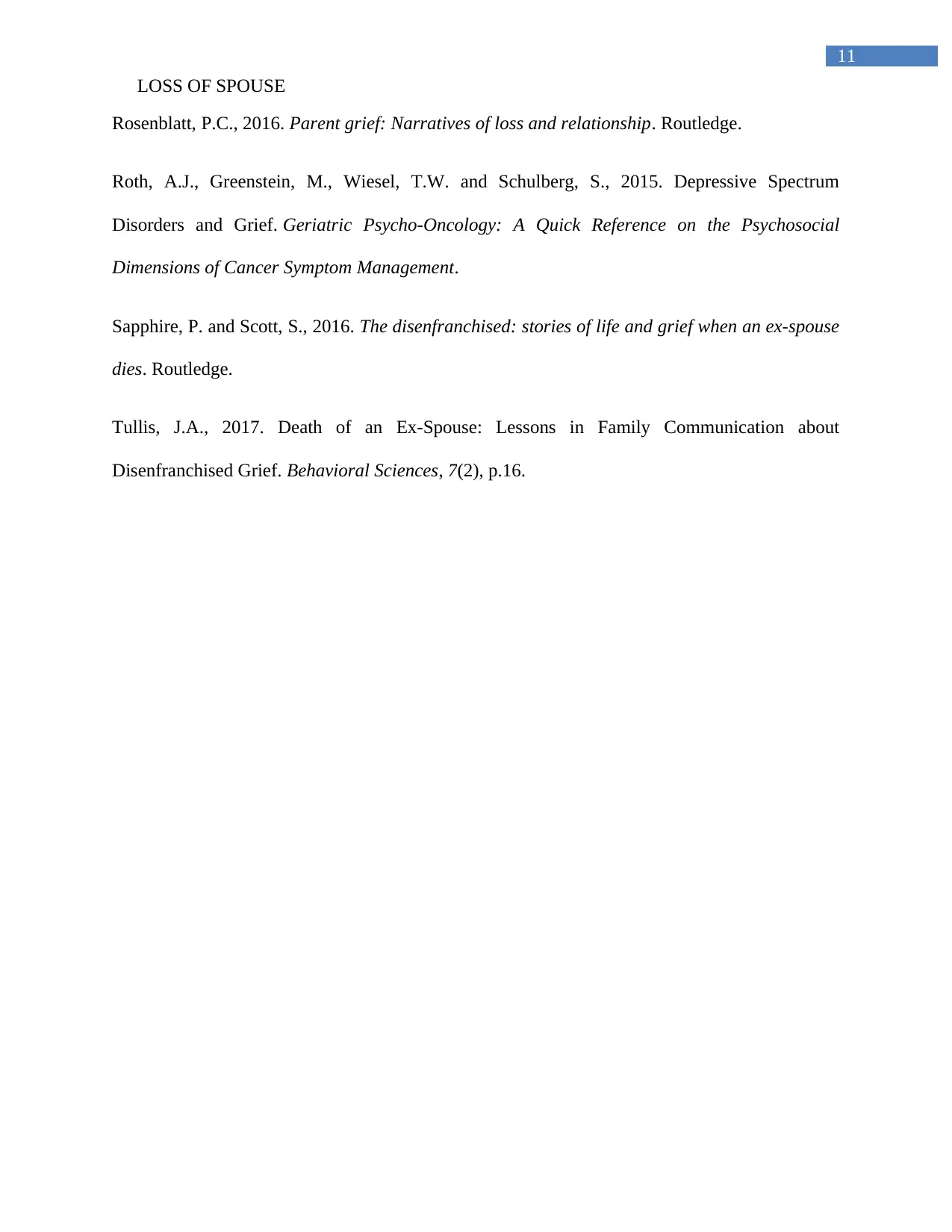
11
LOSS OF SPOUSE
Rosenblatt, P.C., 2016. Parent grief: Narratives of loss and relationship. Routledge.
Roth, A.J., Greenstein, M., Wiesel, T.W. and Schulberg, S., 2015. Depressive Spectrum
Disorders and Grief. Geriatric Psycho-Oncology: A Quick Reference on the Psychosocial
Dimensions of Cancer Symptom Management.
Sapphire, P. and Scott, S., 2016. The disenfranchised: stories of life and grief when an ex-spouse
dies. Routledge.
Tullis, J.A., 2017. Death of an Ex-Spouse: Lessons in Family Communication about
Disenfranchised Grief. Behavioral Sciences, 7(2), p.16.
LOSS OF SPOUSE
Rosenblatt, P.C., 2016. Parent grief: Narratives of loss and relationship. Routledge.
Roth, A.J., Greenstein, M., Wiesel, T.W. and Schulberg, S., 2015. Depressive Spectrum
Disorders and Grief. Geriatric Psycho-Oncology: A Quick Reference on the Psychosocial
Dimensions of Cancer Symptom Management.
Sapphire, P. and Scott, S., 2016. The disenfranchised: stories of life and grief when an ex-spouse
dies. Routledge.
Tullis, J.A., 2017. Death of an Ex-Spouse: Lessons in Family Communication about
Disenfranchised Grief. Behavioral Sciences, 7(2), p.16.
⊘ This is a preview!⊘
Do you want full access?
Subscribe today to unlock all pages.

Trusted by 1+ million students worldwide
1 out of 12
Related Documents
Your All-in-One AI-Powered Toolkit for Academic Success.
+13062052269
info@desklib.com
Available 24*7 on WhatsApp / Email
![[object Object]](/_next/static/media/star-bottom.7253800d.svg)
Unlock your academic potential
Copyright © 2020–2026 A2Z Services. All Rights Reserved. Developed and managed by ZUCOL.




